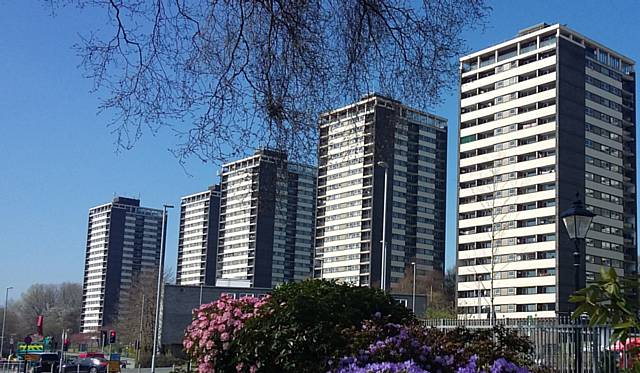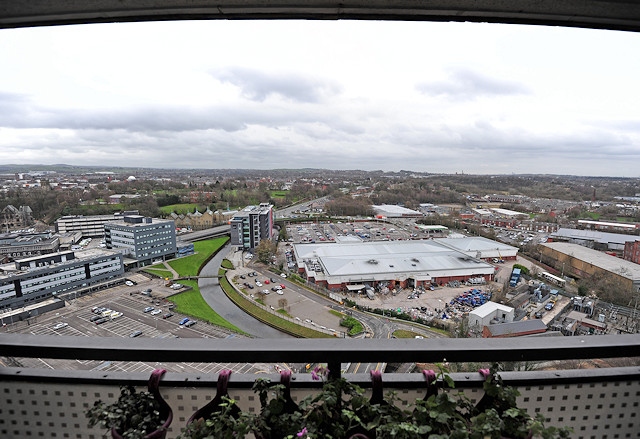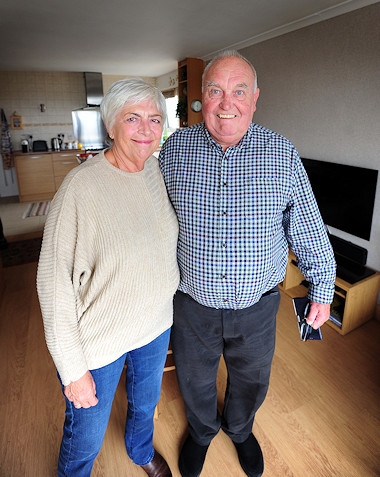‘They will have to drag me out’ – Seven Sisters tenants on life in the famous tower blocks
Date published: 20 February 2019

View of Rochdale’s iconic Seven Sisters tower blocks
The Seven Sisters tower blocks have dominated the Rochdale skyline for five decades.
The landmark College Bank flats which loom over the town centre are seen as iconic to some, but are an eyesore to others.
Built in the late 60s and early 70s, they were originally sought after by young professionals. But over the years they have gained an unwelcome reputation as a sink estate, with high levels of deprivation.
But for those who live there they are simply ‘home’ – the place where they feel comfortable, settled and a sense of belonging.
Yet tenants of ‘The Big Four’ blocks – Mitchell Hey, Dunkirk Rise, Tentercroft and Town Mill Brow – are facing an uncertain future, with the 19-storey flats facing demolition under Rochdale Boroughwide Housing’s (RBH) regeneration masterplan.
RBH says repairing the 60s blocks would be too expensive, push up management fees and only serve as a short-term fix – but have pledged that anyone who wishes to stay in the area will be able to.
At present a ‘supplementary planning document‘, which would guide redevelopment of College Bank and nearby Lower Falinge, has been put out to public consultation by Rochdale Council.
Setting out a vision for a mix of ‘new and improved homes’, extra footpaths, cycle lanes and leisure facilities, it draws on landlord RBH’s ‘masterplan’ – a ‘companion document’ which envisages ‘a vibrant mixture of living, working and recreational opportunities’.
But it is this plan that also proposes knocking down four of the Seven Sisters – which house a total of 480 flats – to make way for 120 new homes.
And for many who live in the threatened tower blocks, the prospect of losing their homes is nothing short of ‘terrifying’.
A group of tenants – all members of Save The Seven Sisters campaign – have gathered in Audrey Middleton’s homely first floor flat in Mitchell Hey to tell of their concerns.

Among them is former Rochdale Mayor Robin Parker, who lives on the ninth floor of Dunkirk Rise.
Donning a Save The Seven Sisters T-shirt, the 74-year-old widower says the prospect of having to leave the flat he shared with late wife Linda fills him with dread.
“We want this decision reversed as soon as possible, because then we have alleviated the stress. It affects your mental health, it’s on your mind in the day and sometimes at night as well, because you are awake thinking about it,” he says.
“It’s terrifying me now, moving at the age of 74, looking at packing up a lifetime of possessions. It’s my retirement home, I can’t do things like I used to. I was Mayor of the borough and everything else – but that doesn’t mean I’m any less terrified than anyone else.”
But along with other College Bank residents – 600 of whom signed a petition against the plans – he is determined to ‘fight the proposals all the way’, branding them ‘the wrong thing to do.
Robin – who served as Mayor in 2008/09 – says there are many things in the SPD and masterplan which he welcomes – including environmental improvements, better access and a new pedestrian crossing over to the town centre.
But he ‘seriously questions’ the need to drop the four tower blocks.
Robin claims the proposals are driven by financial concerns – access to grants and lower maintenance fees – instead of the welfare of residents.
“It’s about greed and money, it’s not about people. They say it’s about people, but it isn’t,” he says.
Contrary to what RBH says, tenants claim there is little wrong structurally with The Seven Sisters and that only a moderate amount of renovation – as well as good basic maintenance – is needed to keep them in good condition for years to come.
Mr Parker says the mixed community envisaged in the masterplan already exists in College Bank.
“If you could pick these up and put them in Salford Quays they would be phenomenally desirable, and I want to see Rochdale be as much a part of the hub into Manchester as Salford is, we all want to see Rochdale do well and thrive.”
And he says the perception of the flats – which are sometimes mocked as a hotbed of drug addicts and benefits claimants – is wide of the mark.
“The fact there are so many empty car parking spaces outside is because so many people are in work – this isn’t an estate for people who are on benefits by any means – but that’s the perception.”
Mark Slater lives in Mardyke – one of the three blocks not earmarked for demolition – but he has lived in others over the years and staunchly opposes the proposals to knock down any of the ‘sisters’.
“I think it would have a drastic effect,” he says.
“My viewpoint is that every one of these blocks is a community in itself. There is a mix of people, but a lot of people are socially vulnerable and need people to speak up for them, otherwise their lives are going to be turned upside down by this.
“There are retired people, people with mental health (issues) and people are dependent on this location for all the social services. Unless someone stands up for this group of people, their lives are going to be totally destroyed.
“Some people have lived in these flats all their lives. Can you imagine being forced to go to another estate you didn’t really want to go to?”
Like Robin, Mark believes there is a widespread misconception about the type of people who live in the flats.
“That seems to be actively promoted – I’ve seen on social media people cracking jokes about people who live in the flats,” he says.
“But there’s such a good mix of people here. They’re typical Rochdale people, they have the time of day for you, they chat to you, it’s a proper community.”
“It’s a really good, vibrant community and it’s being destroyed for the fact that RBH want to bring in money.”
And – over tea and biscuits provided by Audrey – he speaks movingly about the tower blocks he sees as his home and his community.
“Your lives revolve around these flats – I can see where I went for my first job, my first school, the hospital I was born in, where my dad used to live; he’s passed away now.
“This is my life, and I can see it from this block of flats. You build your lives around these flats and everybody – certainly the long-term tenants – has a similar story.”
Kath Thomas, who lives on the 16th floor of Dunkirk Rise, is also part of the Save the Seven Sisters campaign.
The 66-year-old says that, were her block to be demolished, she would not be able to afford somewhere of a similar size or standard with the money she would receive for it – and being retired, a mortgage would not be an option.
“I feel very angry about it,” says the former nurse and foster carer – who describes her flat as ‘lovely’.
“If there was a need to knock them down, I could understand it, but there are people in these flats that have different levels of health.
“But if you were to get those flats and lay them out on a street grid you would only have the same number of people with the same mix of problems – it’s like a street in the sky.”
And she says she is reluctant to carry out work to her flat as she does not know how much longer she can expect to live there.
“It could be 15-20 years, or it could be sooner – but we could be here in 15 years’ time talking about the same thing.”

Couple Alan Healey and Margaret Cigna, also of Dunkirk Rise, are also worried about having to leave the ‘nice, lovely’ flat where they thought they would spend the rest of their lives after moving in in 2000.
“It’s stressful because it’s uncertain,” says Margaret.
“We don’t know if we should move or if we should stay. Should we move now, in our 70s, or will we be forced to move in our 80s?”
And Alan echoes her concerns: “There are particularly stressful things in your life and one of them is having to move your home. Being forced to move is awful, when you choose to move you are generally going somewhere nice, so you are looking forward to it.”
The semi-retired electrician said: “I think it’s disgusting. We have purchased it (in 2005) in our 60s and our plan was this is where we will stay for the rest of our lives. We have renovated the flat and spent quite a lot of money on it and now they come and tell us they are going to knock it down.”
Beryl Maguire is 83 years of age – but she says she won’t be leaving her Dunkirk Rise flat without an almighty fight.
“I don’t want them knocked down, I love where I am, really love it. When I’m coming back off my holidays, come off the motorway and see The Seven Sisters, I love it.
“I want to stop here, I am stopping here.
“They will have to drag me out – I’m not going to go!”
The widower says she has never been ill but has recently found the stress of the situation ‘getting her down’ to the point she has had to see a doctor.
And Audrey Middlehurst, also a widow, says she also has no desire to leave her flat in Mitchell Hey – her home since 1988.
“Now my husband Bob isn’t here it’s very convenient for me, being on my own,” said the 83-year-old.
“I have lots of friends around here and it’s very convenient for trams and trains and I have a garage, it’s just very convenient for me – and I enjoy my flat, like Beryl does.
“I look forward to coming back here, it’s home and it’s comfortable.”
And she says the worry of the situation has also taken its toll.
“I have had a lot of problems recently and it’s not making it any easier. I broke my arm, I had gastric problems and had a cataract done this year. This on top of all that is making it so awful.”
Like Robin, she does not want to leave behind memories of her late partner – husband Bob – and the reminders she sees around her every day.
“They don’t move with you,” they both agree, sadly.
Last month, a spokesman for Rochdale Boroughwide Housing said the charity would support all tenants affected by the proposals as they progress.
They said: “We would not expect all households to move at the same time and, as we are doing in Lower Falinge, households living in College Bank would be rehoused in small phases as we build new homes.
“Our extensive consultation, since 2016, has included knocking on every door in College Bank and Lower Falinge, speaking to over 600 households, in addition to a series of community workshops and twice-weekly drop in sessions.
“We will continue to provide advice and assistance to all residents affected by the proposals, providing tailored support for those households who need it so that everyone can move into a good quality home that meets their needs.”
Nick Statham, Local Democracy Reporter
Do you have a story for us?
Let us know by emailing news@rochdaleonline.co.uk
All contact will be treated in confidence.
Most Viewed News Stories
- 1Middleton school hails another outstanding inspection result
- 2Drugs and cash seized during morning raids at suspected stash houses
- 3Former councillor and hospital campaigner Jean Ashworth has died
- 4No trams between Oldham and Rochdale this Sunday
- 5Northern Healthcare opens supported living service in former Rochdale hotel
To contact the Rochdale Online news desk, email news@rochdaleonline.co.uk or visit our news submission page.
To get the latest news on your desktop or mobile, follow Rochdale Online on Twitter and Facebook.


